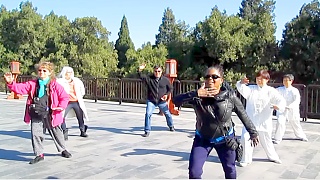
|
30 popular drinks and beverages you might encounter in China, including traditional favorites and popular choices:
Green Tea (绿茶, lǜchá) - Refreshing and commonly served in Chinese restaurants and households.
Black Tea (红茶, hóngchá) - Another classic tea variety enjoyed across China.
Oolong Tea (乌龙茶, wūlóngchá) - Semi-oxidized tea with a diverse range of flavors.
Jasmine Tea (茉莉花茶, mòlìhuā chá) - Fragrant tea infused with jasmine flowers.
Pu-erh Tea (普洱茶, pǔ'ěrchá) - A fermented tea known for its earthy flavor and health benefits.
Chrysanthemum Tea (菊花茶, júhuā chá) - Light and floral tea made from chrysanthemum flowers.
Hawthorn Juice (山楂汁, shānzhā zhī) - Tart and slightly sweet juice made from hawthorn berries.
Coconut Water (椰子水, yēzi shuǐ) - Refreshing and hydrating natural drink from young coconuts.
Soy Milk (豆浆, dòu jiāng) - Nutty and creamy beverage made from soybeans.
Milk Tea (奶茶, nǎichá) - Popular sweetened tea with milk, often served cold or hot.
Bubble Tea (珍珠奶茶, zhēnzhū nǎichá) - Sweetened tea or milk drink with chewy tapioca pearls.
Lemon Tea (柠檬茶, níngméng chá) - Tea infused with lemon juice, often served cold.
Lü Cheng Ice Tea (绿茶, lǜchá) - A popular bottled tea often found in convenience stores.
Chrysanthemum Tea (菊花茶, júhuā chá) - Light and floral tea made from chrysanthemum flowers.
Soy Milk (豆浆, dòu jiāng) - Nutty and creamy beverage made from soybeans.
Milk Tea (奶茶, nǎichá) - Popular sweetened tea with milk, often served cold or hot.
Bubble Tea (珍珠奶茶, zhēnzhū nǎichá) - Sweetened tea or milk drink with chewy tapioca pearls.
Lemon Tea (柠檬茶, níngméng chá) - Tea infused with lemon juice, often served cold.
Lü Cheng Ice Tea (绿茶冰, lǜchá bīng) - Bottled green tea served chilled with ice.
Beer (啤酒, píjiǔ) - Commonly enjoyed alcoholic beverage in China, with popular brands like Tsingtao and Snow Beer.
Rice Wine (米酒, mǐjiǔ) - Traditional Chinese alcoholic beverage made from fermented rice.
Baijiu (白酒, báijiǔ) - Strong Chinese distilled spirit made from grains, commonly consumed during celebrations.
Plum Juice (酸梅汤, suān méi tāng) - Tangy and sweet juice made from preserved plums.
Winter Melon Tea (冬瓜茶, dōngguā chá) - Refreshing tea made from winter melon, often sweetened.
Red Bean Soup (红豆汤, hóngdòu tāng) - Sweet soup made from boiled red beans, served hot or cold.
Honey Citron Tea (柚子蜂蜜茶, yòuzi fēngmì chá) - Tea infused with honey and citron fruit, served hot.
Laba Congee (腊八粥, làbā zhōu) - Sweet rice porridge traditionally enjoyed on Laba Festival, made with various ingredients like nuts and dried fruits.
Wolfberry Tea (枸杞茶, gǒuqǐ chá) - Tea made from goji berries (wolfberries), known for their health benefits.
Osmanthus Tea (桂花茶, guìhuā chá) - Fragrant tea made from osmanthus flowers, often sweetened.
Lemon Water (柠檬水, níngméng shuǐ) - Simple infused water made with lemon slices and water.
These are just a few examples of the diverse and delightful drinks you can enjoy in China. Each region may have its own specialties and variations of these beverages.
|

 FenJieZhou Island 分界洲, HaiNan province
FenJieZhou Island 分界洲, HaiNan province




